 Petzlover
Petzlover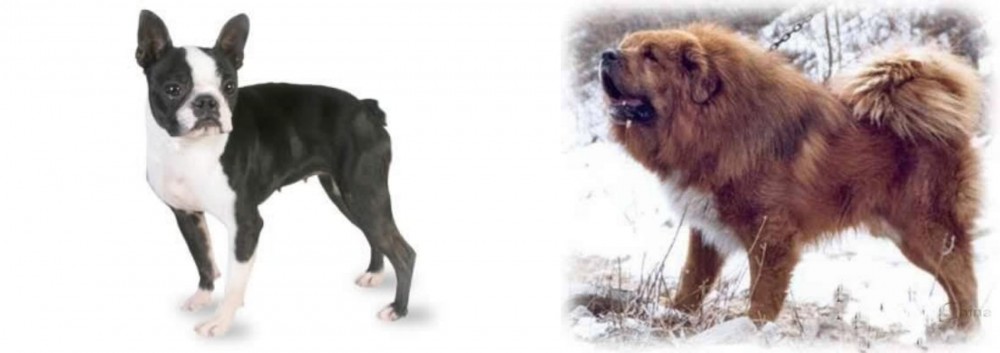 Boston Terrier is originated from United States but Tibetan Kyi Apso is originated from China. Boston Terrier may grow 28 cm / 11 inches shorter than Tibetan Kyi Apso. Boston Terrier may weigh 34 kg / 74 pounds lesser than Tibetan Kyi Apso. Both Boston Terrier and Tibetan Kyi Apso has almost same life span. Both Boston Terrier and Tibetan Kyi Apso has same litter size. Boston Terrier requires Low Maintenance. But Tibetan Kyi Apso requires Moderate Maintenance
Boston Terrier is originated from United States but Tibetan Kyi Apso is originated from China. Boston Terrier may grow 28 cm / 11 inches shorter than Tibetan Kyi Apso. Boston Terrier may weigh 34 kg / 74 pounds lesser than Tibetan Kyi Apso. Both Boston Terrier and Tibetan Kyi Apso has almost same life span. Both Boston Terrier and Tibetan Kyi Apso has same litter size. Boston Terrier requires Low Maintenance. But Tibetan Kyi Apso requires Moderate Maintenance
 Nicknamed the American Gentleman, the Boston Terrier is the result of crossing the British Bulldog with the white English Terrier. At first the Boston Terrier was bred to be a fighting dog, but since then, undesirable characteristics have been bred out and today the Boston Terrier is regarded as an indoor dog that doesn’t tolerate extreme weather conditions.
Nicknamed the American Gentleman, the Boston Terrier is the result of crossing the British Bulldog with the white English Terrier. At first the Boston Terrier was bred to be a fighting dog, but since then, undesirable characteristics have been bred out and today the Boston Terrier is regarded as an indoor dog that doesn’t tolerate extreme weather conditions.
The breed emerged in the 1870s when Robert Hooper from Boston bought a dog thought to be a mix of a Terrier and Bull type lineage. A specialist breed club was formed in 1891 and in 1979 the commonwealth of Massachusetts named the Boston Terrier the Official State Dog. By the 20th century, the breed’s color and patterns were standard and an essential feature.
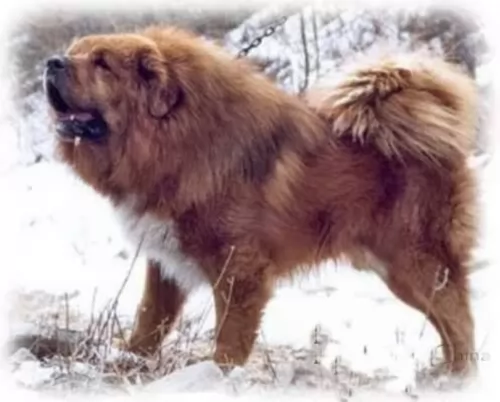 The Tibetan Kyi Apso is an ancient rare breed. In fact, it is one of the rarest breeds on earth. Coming from Tibet, the Kyi Apso guarded livestock and homes for the nomads of the “rooftop of the world”. Apso means bearded and Kyi meand dog thus the Kyi Apso is a bearded dog.
The Tibetan Kyi Apso is an ancient rare breed. In fact, it is one of the rarest breeds on earth. Coming from Tibet, the Kyi Apso guarded livestock and homes for the nomads of the “rooftop of the world”. Apso means bearded and Kyi meand dog thus the Kyi Apso is a bearded dog.
This breed is very intelligent with a great personality and charm. In Western countries the breed is called Apso Do-Kyi or the Tibetan Collie. The first time these dogs are mentioned in any kind of documents was the late 19th and early 20th centuries in writings about Central Asian dogs. The Kyi Apso is related to the Tibetan Mastiff.
The breed is known to have been imported by Captain George Augustus Graham as a Tibetan wolf dog. The dog was also known to be owned by the 13th Dali Lama. There have not been many exported to Europe or North America, with the first coming to North America in the 1970’s.
There have been no registered litters since 2000 and the Tibetan Kyi Apso Club closed in 1999.
 The Boston Terrier is a lively, strong-willed breed with an alert expression and fairly large, erect ears. He is a small to medium sized dog and his square muzzle puts him among the Bull breeds.
The dog is compact in build and varies quite significantly in size. Weight with the dog is actually divided into 3 categories – lightweight (under 6.8kg), middleweight (up to 9kg) and the heavyweights being between 9.1kg and up to 11.4kg. The Boston has a short head and a naturally short, low-set tail. The coat is short and smooth, and the colour can be brindle with white markings, brown and white or black and white.
The Boston Terrier is a lively, strong-willed breed with an alert expression and fairly large, erect ears. He is a small to medium sized dog and his square muzzle puts him among the Bull breeds.
The dog is compact in build and varies quite significantly in size. Weight with the dog is actually divided into 3 categories – lightweight (under 6.8kg), middleweight (up to 9kg) and the heavyweights being between 9.1kg and up to 11.4kg. The Boston has a short head and a naturally short, low-set tail. The coat is short and smooth, and the colour can be brindle with white markings, brown and white or black and white.
It’s the energetic liveliness of the Boston Terrier that makes him such a lovable and popular pet. He has an affectionate, gentle nature that makes him a fantastic family pet and he gets on well with children and pets in the home. He can adapt to city or country life. One or two interesting facts of this breed are -
with his short nose, he is prone to drool and snore
he is prone to corneal ulcers because of his large, somewhat protruding eyes
with a small pelvis, the females often battle with the birthing process and may require a caesarean section.
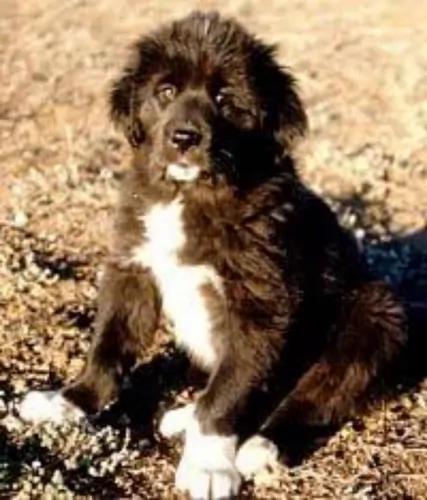 The Tibetan Kyi Apso is a large dog with a bearded face, full coat and curled tail. They have longer hair than the Mastiff and of course the shaggy, bearded muzzle. It is not as hefty as the Mastiff of course, and he is more athletic. Like many primitive dogs before them, the Kyi Apso comes into heat only one time a year, contributing to the rareness of the breed.
The Tibetan Kyi Apso is a large dog with a bearded face, full coat and curled tail. They have longer hair than the Mastiff and of course the shaggy, bearded muzzle. It is not as hefty as the Mastiff of course, and he is more athletic. Like many primitive dogs before them, the Kyi Apso comes into heat only one time a year, contributing to the rareness of the breed.
With their bearded face, the breed’s head appears bigger than it is. The ears are shaped as a V and skull is flat with the eyes on the outside of it. Their muzzle looks larger than it is due to the beard. Nose and lips are black, eyes are amber and almond shaped.
The coat is double, sheds odors and molts once a year. The coat can be black and tan, shades of red, blue-gray with white and solid black.
 The Boston Terrier is such a sweet little dog, but you can’t really say what your puppy’s personality will be as personality varies quite a bit between individual Boston’s. Remember that just like with a human child, your puppy will turn out with characteristics that can be attributed to the way he was raised. The Boston just loves his human family and he wants to be part of all your activities, even though he may gravitate towards one favorite family member.
The Boston Terrier is such a sweet little dog, but you can’t really say what your puppy’s personality will be as personality varies quite a bit between individual Boston’s. Remember that just like with a human child, your puppy will turn out with characteristics that can be attributed to the way he was raised. The Boston just loves his human family and he wants to be part of all your activities, even though he may gravitate towards one favorite family member.
Your Boston is a Terrier and that means he is full of life and will require being exercised by you. He can’t just be left outdoors day after day because this is one particular breed that can’t adapt to changing weather conditions. He likes being inside where the temperature is more even. Look after your Boston, because if you do, you’ll be rewarded by having one of the best friends you’ve ever had.
 Boston Terriers are generally healthy, feisty little dogs but it is always wise to know that you may well come across some health conditions that can affect your pet.
Boston Terriers are generally healthy, feisty little dogs but it is always wise to know that you may well come across some health conditions that can affect your pet.
Your Boston may well have to contend with cataracts, and in the dog world, this isn’t only an ailment for old dogs. Juvenile cataracts can develop in young puppies already. Cherry Eye is another eye problem with a prolapse of the gland of the third eyelid. It is also an eye disease than can be found in young dog of less than a year old.
Boston Terriers actually have a fairly high incidence of deafness in one or both ears. White Bostons tend to produce more puppies with deafness.
The Boston Terrier is a brachycephalic dog and therefore more predisposed to Brachyphalic Syndrome where the dog battles to breathe because of too much soft tissue which forms in the airways.
To avoid many dog diseases with your Boston, buy your puppy from a reputable dog breeder who screens dogs used in a breeding program as this prevents puppies inheriting genetic disorders.
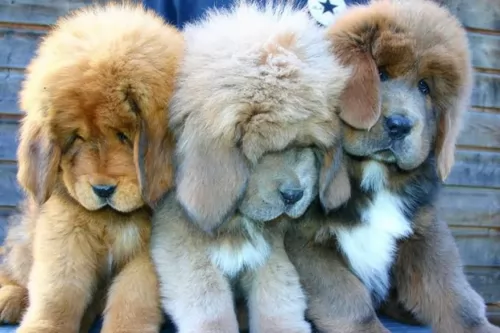 Bloat: Fatal unless treated immediately by a vet. Common to this size dog and can be controlled by eating habits.
Bloat: Fatal unless treated immediately by a vet. Common to this size dog and can be controlled by eating habits.
Other than these the Tibetan Kyi Apso is an ancient dog and very healthy as they were mostly isolated and did not interbreed. No genetic predetermined health problems.
 The Boston Terrier is a lively dog, and even though he doesn't have any extreme exercise requirements, he will still require you exercising him by taking him on walks, or having ball games with him. As an essentially indoor dog, he can even enjoy some quieter indoor games.
The Boston Terrier is a lively dog, and even though he doesn't have any extreme exercise requirements, he will still require you exercising him by taking him on walks, or having ball games with him. As an essentially indoor dog, he can even enjoy some quieter indoor games.
You’ll be able to gauge how much your pet requires in terms of high quality food, but by the time he is an adult, he usually has one or two bowls of food a day. Size and age play an important role in determining his eating habits. Home made foods made up of rice, meat and vegetables are always welcome for your pet and these can be added into his top quality commercially produced dog food. For a healthy dog who is free of skin problems include some raw meat in the diet from time to time. Always make sure that there is a bowl of fresh, cool water which is available 24/7.
With his short coat, the Boston Terrier isn’t a heavy shedder and is low maintenance in terms of keeping his coat groomed. Brush him at least twice a week to remove loose hairs and to also prevent flea and tick infestations. Brush his teeth 2 or 3 times a week to ensure no plaque build-up which can damage the teeth. Never use human toothpaste, but invest in special toothpaste and -brush for dogs. If he is essentially an indoor dog, you may have to get the vet to trim his nails too.
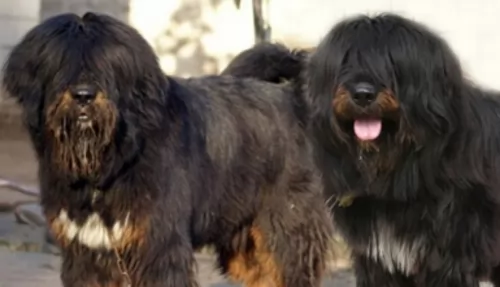 1Feeding the puppy – grow quickly don’t overfeed. High quality large breed puppy food and feed 4 small meals a day.
1Feeding the puppy – grow quickly don’t overfeed. High quality large breed puppy food and feed 4 small meals a day.
2.Feeding the adult – don’t over feed and don’t feed right before or after exercise due to the possibility of bloat. Feed high quality adult large breed dog food 2 x day in smaller meals.